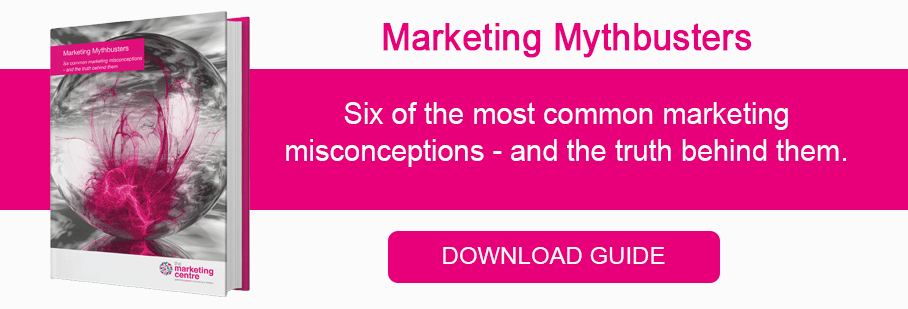Marketing is plagued by mythology. Day-to-day, we deal with many misconceptions and malversions: misguided ideas which too many business leaders have come to believe.
Often these myths aren’t malicious, they usually come from a lack of understanding around what makes great marketing or from having being burnt by bad practitioners in the past. We’re here to clear things up.
In this series of articles, we’re taking those myths to task one by one. We’ve already tackled “marketing is all about lead generation.” This week, the view that marketing is all inspiration and not so much perspiration.
What is the myth?
That all marketing needs is a brilliant idea - a catchphrase, a gimmick, a hashtag. Get that right and the rest will work itself out. Many people see marketing as a flash of inspiration and a bit of planning whereas the opposite is true.
What we need in marketing, so the myth goes, are ‘ideas people’ - those individuals who can pop up with something wacky, crazy or creative in every meeting. Proponents of this myth would have it that the ‘big idea’ alone turns out spectacular successes and creates lasting brand visibility.
The truth
You need a healthy blend of strategy, execution, measurement and, yes, inspiration to get the best results.
Creativity and big ideas are an absolutely vital element of marketing - but they must fit within a wider marketing plan which is going to achieve business growth. The whole process looks a little like this:
- Objective
- Strategy
- Execution
- Test and review
- Do more of what works
- Repeat
When people outside the business think of marketing, they often refer to some of their favourite advertising campaigns - ‘Should have gone to Specsavers’ or Nike’s ‘Nothing beats a Londoner’ ads, for example.
What you see - the advertising, the content, the social persona - is brought to you by a great deal of unseen effort and analysis: in short, Marketing planning. ‘Should have gone to Specsavers’ was absolutely a brilliant idea. But to suggest that’s all it was is myopic in the extreme. The campaign was created by an experienced creative and marketing team, strategically executed following deep customer research, aligned with the growth goals of the business.
And the team still continued to test and measure even when they started to see success. They dropped ‘Should have gone...’ for ‘Must have gone to Specsavers’ (MHGTS) for a short period. The move made some sense - it was a more positive message, and it allowed them to showcase their great range of glasses. They tested, measured and when they found it didn’t have the same impact, they reverted.
Conducting small scale tests is far easier than it used to be. You may not run TV ads, but online, advances in digital tools mean a business can quickly conduct small scale tests of creative work - showing social media ads to a small targeted audience, for instance, or A/B testing landing page performance, changing up PPC campaigns, tweaking calls to action. These tools make it easy to test and, importantly, measure results to see what works and what doesn’t.
The moments of inspiration that create these campaigns are a vital component of marketing, but if they’re only used in isolation then they’re not going to achieve the desired impact and/or results. Edison was right, the inspiration/perspiration ratio is heavily weighted towards the latter.

For creative talent and inspiration to work for your business, they need to fit within a wider marketing strategy. The big idea needs to be aligned with the business’ goals and budget, as well as the audience’s preferences and desires, in order to produce a positive ROI. In marketing you need to continuously test, measure and analyse in order to improve your results and identify what really makes your audience tick.
Strategy lays the groundwork for the great creative ideas to succeed. Without strategy, there’s nothing to bring those ideas to audiences, and nothing to push them to their full potential.
Our Marketing 360 Healthcheck will help you take stock of your strategy - and if you’re stuck for a big idea, let a case study inspire you.
Image credit:
Thomas Edison quote via BK on Flickr




